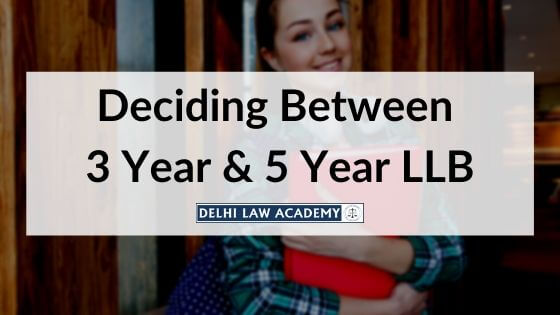Last Updated on Nov 14, 2019

Deciding Between 3 Year and 5 Year LLB? We have got you covered. Here is some necessary information related to 3 year and 5 year LLB Courses available in our country. We hope after reading this blog, you get to know the key differences and decide between the options present.
Of late, law degrees have become highly sought-after. The surge comes as no surprise – a position in the legal sector is well-respected, and study leading up to it isn’t just cramming statutes and cases, but one that deepens the experience and strengthens understanding of many aspects of human life. A lawyer is no longer seen as just some black-robed person. Any professional who wishes to strengthen and make more appealing his resume could get a law degree.
The other category of people that could aim for a Legum Baccalaureus (“LLB” -Bachelor of Laws) is the high school pass outs. On these lines, The Bar Council of India confers two variants of the degree on successful completion of the respective course: One, an LLB degree for a three-year course or two, a B.A. LL.B., BBA. LLB., B.Com. LL.B or a B.Sc. LL.B. for a five-year program. And that’s the paradox of choice – which one is better?
The three-year LLB degree covers only law subjects and is offered by few universities despite being quite popular.
If you consider the purpose they serve, the answer is simple. If the candidate has just finished Class 12, he should choose the integrated five-year degree, which is basically a dual degree program. The entrance for the same is CLAT.
It covers both law subjects and subjects from either a B.A., BBA., B.Com., or B.Sc degree, depending on the choice of institution and personal preference. On the other hand, if the candidate already has an undergraduate degree, but wishes to go into the legal profession or just wants to add value to his previous degree, he should go for the three-year course. Let’s look at other ways these degrees differ, and the course of action to pursue respective degree:
Three-year LL.B.
The three-year LLB degree covers only law subjects and is offered by few universities despite being quite popular. A very prevalent lackadaisical attitude amongst professionals studying law is often quoted as the reason for this. The course covers both theoretical and practical aspects of law, and is in no way relaxed – there is a minimum compulsory attendance percentage, and the course is interlaced with assignments. Professionals who would like to work in the judiciary, litigation, civil services or academics department form most of the aspirants.
Eligibility
The old rule was that only a person with a graduate degree could apply. However, now, applicants who have completed 10+2 through correspondence or distance-learning (but not through the open university system directly) are considered eligible. While there are law colleges that admit students on the basis of marks secured in their qualifying degree, a vast majority of top universities admit students through entrance exams only.
Top Colleges and Entrance Exams
Faculty of Law, DU and Faculty of Law, Banaras Hindu University (BHU) are top universities that offer the three-year LLB course. A graduation degree with 50% marks is the basic qualification required. They both have their separate entrances: the DU LLB and the BHU LLB respectively. PU-LL.B. is another entrance for select law universities in Punjab. ExamVictor offers mock tests, online courses and distant learning courses for these exams that extensively cover the syllabus.
There are also quite a few notable universities (like Jindal Global Law School, IIT Kharagpur) that accept Law School Admission Test (LSAT) scores. This pen and paper test has four sections that need to be completed within 2 hours and 20 minutes (strictly thirty-five minutes each).
Admission to four government and a few self-financed private law colleges in Kerala is done on the basis of merit in the entrance exam conducted by CEE, which is typically in September. This is a three-hour paper with questions based on General Knowledge, Aptitude for Legal Studies and General English.
Admission to every government law college in Maharashtra is through the online MAH CET conducted by the DHE, usually in June.
Summary
This blog contains all the necessary information related to 3 year and 5 year LLB Courses. All the major differences and other necessary details are provided in-depth. Do share your views in the comment section below.

